To test the device we used the following configuration.
Processor: CPU Intel i5 3570k.
Memory: G.skill X 1,600mhz 8GB (2x4gb).
Solid State Drive : Samsung 840 250gb SSD.
Motherboard : Asus Sabertooth z77.
Power Supply: Seasonic Platinum 1000w.
Graphics Card: Nvidia GTX Titan.
We used a 4GB file made up of mixed files and transferred to and from the MX-ES 32GB Drive.

Our findings indicate a huge increase in read bandwidth when moving between the USB 2.0 and USB 3.0 interface. The USB 3.0 was around 4x faster at transferring the same files when comparing the read speeds, although the write speeds were not so far apart.

After testing the mixed files and seeing that the write speeds felt somewhat lacking, we decided to look at singular larger files, in this case a 24.1gb MVK video file. Alongside this we wanted to see how the MX ES performed when transferring 4GB of the same file type. In this case we used JPEG files.
As you can see the results are much more impressive when transferring larger video files – recording reads of 136 MB/s and writes of 146 MB/s. The 4GB of Jpeg files that we used also shows pretty good speeds when comparing to the mixed file results. The 4GB of jpegs came in with reads of 146.2 MB/s and writes of 91.2 MB/s.
 KitGuru KitGuru.net – Tech News | Hardware News | Hardware Reviews | IOS | Mobile | Gaming | Graphics Cards
KitGuru KitGuru.net – Tech News | Hardware News | Hardware Reviews | IOS | Mobile | Gaming | Graphics Cards



Looks like a capable little drive at a good price.